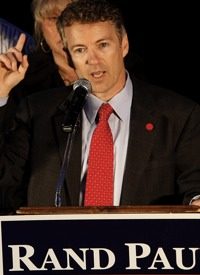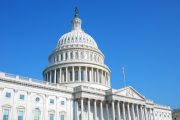
You might wonder if Dr. Rand Paul, Republican candidate for U.S. Senator from Kentucky, will ever be plagued by what President Bush 41 (that’s "Poppy" Bush for those of you who are not into the numbers game) called "the vision thing," the absence of which seemed to plague a President who, having reached the White House as a senior citizen, seemed still to be trying to figure out just who and what he was. ("Maybe I’ll turn out to be another Teddy Roosevelt," he said at one point.
(There were still a few Republicans extant who knew Teddy Roosevelt, or at least knew of him from sources close to the old Rough Rider, and knew that "Poppy" Bush was no TR.) As for Paul, how many candidates for U.S. Senate do eye surgery and deliver campaign speeches on the same day?
An article now out in GQ magazine notes that a year ago, Rand Paul wasn’t even a politician in Kentucky or anywhere else. He was, and is an ophthalmologist. "If Bill Clinton is famous for looking people in the eye and making them feel like the only person in the room, Paul gives the impression he’s checking for cataracts," writes Jason Zengerle, the author of the piece.
Well, let us not make too much of the man’s profession. Ronald Reagan was an actor, whose best performance was his semi-plausible portrayal of a conservative determined to roll back the size and scope of the federal government. (Just be kind and don’t look at the budget numbers for the years he was in office.) Harry Truman was a haberdasher who often seemed to be talking through his hat. Abe Lincoln was a storekeeper and self-educated country lawyer. Washington grew tobacco (Gasp!). Obama was a community organizer. And Richard Nixon had perhaps the worst preparation of all for wielding the tremendous power of the presidency: He had been Vice President.
The media, Left and Right, seem fascinated with Rand Paul, the 47-year-old son of Texas Congressman and former Republican presidential candidate Ron Paul. They portray him as fringe, while trying to deal with the fact that he won the overwhelming majority of Republican primary votes against Trey Grayson, Kentucky’s Secretary of State who was heavily backed by the party establishment from Washington, most notably by the state’s senior senator and the party’s leader in the Senate. "I need Trey Grayson," Senate Minority Leader Mitch McConnell told Kentucky Republicans. Republican voters said, in effect, "Who needs Mitch McConnell?"
Who, indeed? Sometimes, a left-leaning publication like GQ or Rolling Stone or Salon.com will give you a clearer picture of Republican leaders than you are likely to get from Fox News, Rush Limbaugh, or even Glenn Beck. The right wing squawk masters are likely to go easy, most of the time, on a Republican reprobate like Mitch McConnell. Simply put, if McConnell had been a Sioux at Little Big Horn, Custer might still be alive. McConnell made it clear he wanted Kentucky Senator and Hall of Fame pitcher Jim Bunning out of the Senate and out of the way. Why? Well, for one thing, Bunning, a true maverick, wouldn’t go along with the bailout of the financial industry engineered by the Bush administration, which a lot of voters seem to think was an Obama creation, and Republicans are generally happy to let them think so.
McConnell, who would have moved heaven and earth to get Bunning to retire, finally got his way when the man who had battled on a baseball diamond against the likes of Mickey Mantle, Hank Aaron, and Stan Musial, grew weary of fighting pygmies in the U.S. Senate, especially those in his own party. Once in the race Paul made it clear that he got involved when he saw Bunning was being pushed out. As GQ noted, he didn’t have to say by whom.
Now, GQ concludes, Rand Paul, this "modern-day revolutionary" beloved by Tea Party activists, is a strong candidate in the fall election and "chances are good he will soon be the most radical member of the U.S. Senate." That, it must be noted, depends on how "radical" is defined, and by whom.
"People try to paint the Tea Party and they say, ‘Oh, the Tea Party is extreme,’" Paul says, as quoted in the magazine story. "I respond right back to them, ‘What is extreme is a $2 trillion deficit!’"
Heavens, yes! Even that old "extremist" Barry Goldwater balked at a tax cut when the budget was only about $11 billion out of balance (on paper at least). But Paul is an "extremist" because he talks about eliminating, or at least greatly weakening, the Federal Reserve Board. He is "extreme" because he believes in property rights and freedom of association. A physician, he respects the right to both life and health and is "extreme" because he regards abortion not as a "reproductive health service," but as the deliberate planned destruction of innocent human life. All of that, save perhaps the part about the Federal Reserve, might have earned an "Amen!" from the vaguely religious and cautiously conservative President Eisenhower a couple generations ago. But now it is described in the "mudstream" media as radical Right.
So is Paul really "too kooky for Kentucky"? Well, perhaps he will turn out to be, if not Teddy Roosevelt, someone too orthodox a Republican for his Tea Party followers. That, at least, is what the left-wing website Salon.com is saying, announcing that, based on the GQ article, Paul has been "cozying up" to the neo-cons, meeting and discussing foreign policy with William Kristol of the Weekly Standard and representatives of the American-Israeli Political Action Committee. Does that mean Paul, once in office will become what one observer called "Senate-ized"? Will he join the dot.com warriors in that fighting neo-con clan, the War of the Month Club conservatives?
Not likely. Paul is a neophyte on foreign policy, and it does not hurt to talk with and maybe gather some worthwhile information from people with different points of view. Who knows, he might even talk with the President of Iran and be excommunicated by Billy Kristol, the high priest of the Church of the Unholy Neocons.
Meanwhile, Mitch McConnell, the grumpy old Republican who disdained Rand Paul and his Tea Party followers, is not up for reelection until 2014, giving him four more years to become increasingly irrelevant before once again facing the voters of the Blue Grass State. Perhaps by then the voters will be even more inclined to buck the "mainstream" establishment and change horses in "mudstream."
Photo of Rand Paul: AP Images



